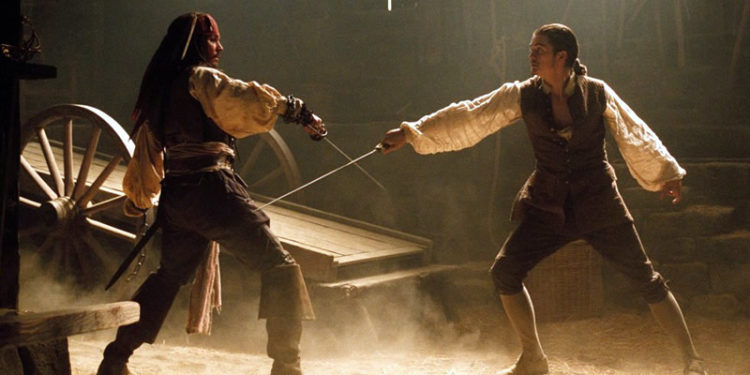Duels that are Fun for Everyone at the Table

Running Duels | Wizard Duels (Coming Soon)
Duels are arranged combat between two people, usually with matched weapons, in accordance with agreed-upon rules. The gauntlet has been thrown and now it is time to run single combat (or a duel) in your game. Throughout our history and fiction, duels standout as scenes full of tension and action. How can you provide that excitement and avoid creating a long drawn-out combat scene while the rest of the table waits? Here are some thoughts and ideas I hope will be helpful.
Reasons for a Duel
Running a duel is an investment in time for the entire table. There are many reasons for a duel scenario that GMs and players can come up with. Duels aren’t always formal and scheduled and can even pop-up suddenly up in your game session for numerous reasons. Here are some potential starters to make sure the duel has a reason to occur and an outcome that matters.
Defending Honor. Many duels happen simply due to the need for someone to defend their honor within an honor code. These types of duels were mostly fought to gain “satisfaction” and restore one’s honor rather than aiming to kill the opponent. You’ll need to have an honor code for someone to defend, which could be created by you or your player. Instead of sending a misbehaving player to jail, have them find out that they broke an honor code and that they are now expected to participate in a duel. This type of duel will usually have rules and may even be scheduled. You could allow for the possibility to avoid the duel with an apologize or other remedy. While avodin
Final Showdown. After losing loved ones and chasing an adversary for years, the PC finally has her chance for revenge. As the party of adventurers closes in on their companions enemy, she yells “Stay back, he is mine! I will face him alone.” It always a good idea to set this type of scene in a dangerous setting like a rooftop, bridge, burning building, or cliff beside a waterfall. These types of settings are exciting and can provide an escape for a villain too if they die off-screen.
Compelled Duel. A PC or NPC could be compelled into a duel from the effects of a magic spell such as the spell Compelled Duel (p.224 Player’s Handbook). Why was this spell cast and by whom?
Trial by Combat. The party is in trouble again! They’ve been arrested and will be standing for trial for crimes they committed (or even better didn’t). Trial by combat (or a judicial duel) was actually used in our world to settle charges where there was little evidence and to settle bitter disputes. An NPC or less martial member of the party could be standing trial and the best duelist in the party could be appointed to complete the combat trial. You could even have all of the party fight for their freedom one by one or as a group.
Prize Fight or Contest. Whether you are running a simple sideshow where a brute challenges passers-by or the main event of in an arena, the key here is that by winning the duel, the PC gets a valuable prize. If you want to keep the fight non-lethal you could use only unarmed strikes or blunted blades. Really anything can be a duel from a bare-knuckle boxing match to a jousting match.
Performance Duel. The rival of the party’s bard has sent out a challenge to see who really is the best singer/dancer/musician/beat poet. While things could get serious and turn to combat, start out with some performance checks and look to see who can get the crowd going the most. There should be lots of opportunities to get the entire party involved here.
Training Trials. Lower level PCs often left some type of order of warriors, monks or wizards to wander around the world. A duel could provide an interesting scene to challenge a player and provide them with a chance to finally graduate or be admitted to the order. For D&D 5e, this could be an exciting way to test a PC as they choose their archetype in the early levels. This could also be something you run in a short session with just one player.
Avoiding a War. In our legends and history there are stories of two armies meeting on opposite sides of a battlefield, calling for single combat to avoid bloodshed. While the historical record might be a little spotty on how often this actually happened, this is no reason to avoid it in your game. By having a champion from each army fight to determine the outcome of the battle, everyone else could go home without a scratch. Single combat can also be an excellent way to handle mass combat, where each of the PCs is involved in some epic showdown, while chaos surrounds them creating the odd hazard or stray attack. The surrounding warriors might even circle the two champions to watch as a single fight determines the outcome of the entire battle.

Rules & Laws
Whether its an impromptu fight demanded during a heated argument or one scheduled for dawn, formal duels need rules. I’m not talking about mechanical rules, but actual rules of engagement from your game world, sometime referred to as a Code Duello. There are countless rules you could come up with and here are some quick rules ideas:
- The duelists start on opposite sides of the street.
- The duelists start back to back and walk 20 paces and fire.
- The challenger who initiated the duel selects the location and the other party selects the weapon.
- There are no rules, only death.
- Duels have been against the law for 100 years.
Regardless of what the rules actually are, what is important is how well known are the rules, are they written down somewhere, and do the players have a chance to figure them out before blades start swinging. Rules are meant to be broken, but what are the impacts of breaking the rules in a duel?
Let’s look at an example from my Seas of Vodari campaign, a swashbuckling world full similar to our own 17th century with more magic. Arushi is an island nation with great inequality between nobles and commoners. The nobles train with rapiers and settle social conflicts in duels intended to clearly determine who has is better with the blade versus killing.
DUELS IN ARUSHI
Duels are completely legal in the island nation of Arushi. The rules of engagement are relatively simple and are as follows:
- The duel must occur outside, in public, during daylight hours.
- Each participant must fight alone and can receive no help from outside sources.
- Each participant must declare a second, who will act as a witness and ensure both participants obey the rules.
- Each participant must fight with the same or similar weapon, determined and agreed to by both parties before the duel begins.
- The participants can agree amongst themselves on what armor and shields will be allowed.
- No magical items or effects may be used before or during the duel to aid one of its participants. Any participant found benefitting from magic will forfeit the duel and be declared dishonorable.
- The duel lasts until one of the participants bleeds, surrenders, or is otherwise prevented from continuing.
In this example, only one actual game mechanic is hinted at with ‘ bleeds, surrenders, or is otherwise prevented from continuing’. The rest of the text all pertains to how the participants (and their allies) conduct themselves, rules of engagement, and how to determine a winner. When worldbuilding, it is always a good idea to set-up the legal system for each nation, city or wherever. Like in our world, countries can have very different legal codes. Try to decide how each place if your world would handle dueling, magic casting, openly fighting in the streets, and other shenanigans. Are weapons allowed or is unarmed combat preferred? In Arushi, requiring daylight and witnesses prevents duels being used as excuses for murder by nobles and starting all out war between noble families.
Determining a Winner
Players and monsters tend to quickly turn into large bags of hit points. The need to reduce an opponent to zero hit points is both time-consuming and nonessential to determine a winner in a duel. When creating your own in-world rules for winning a duel, consider the following game mechanics to determine a winner.
Three Touches/Hits.
The first participant to successfully hit three attack rolls against their opponent is the winner. Any touch could also be the last if the hit is enough to bring the opponent to 0 hit points. This method helps to quickly determine a winner, but as soon as characters start to get multiple attacks duels will be very short. Also, this method could become very unsatisfying if the first few rounds are one-sided. The three touches method also works if you want a non-lethal duel with blunted blades such as in a contest or trial.
To the Blood.
The first participant to reduce their opponent to half of their max hit points wins. ‘To the blood’ refers to the bloodied condition from 4th edition.
To the Death.
The first participant to fall unconscious loses. This method could work well at lower levels but could take a significant amount of time at higher levels, even with all of the extra attacks due to damage reduction, self-healing, and resistances. If the duel is to the death, it might be a good idea to have a some kind of medical professional on the scene.
Other Victory Conditions.
There are countless other ways to decide victories such as pushing an opponent out of the ring or knocking an opponent off a plank or log. These provide a victory condition without requiring the participants to wear down hit point pools, but coming up with a challenge/contest to roll for is harder to run than straight up combat.

Running a Duel
Setting
Try establishing an interesting and dramatic location for your duel.
- an arena with a screaming crowd
- on a tippy plank over a pool of filthy water at a tavern surrounded by drunk gamblers
- high above the deck of a ship during naval combat
- in the town square on market day
- high noon at the edge of town
- on a cathedrals rooftop or belltower after a chase
- on a balcony at a formal ball as guests rush outside to watch
- pretty much any raised surface which could result in a fall into a chasm, lava pit, or rushing water
Combat
To run a duel, you don’t need a new and complex set of rules. For example, D&D 5e already has everything we need to run combat with initiative, attack rolls, saving throws, and advantage/disadvantage. Here is a simple framework for running a duel in the nation of Arushi (see rules above) for D&D 5e.
- An option could be to start the duel with a morale/intimidation round using skill checks, contests between the participants, or even involving the other players. This could also provide a last opportunity for the duelists and their seconds to come up with a way to avoid the duel.
- Each participant makes an initiative check, just like in standard combat. I suggest re-rolling initiative each round to keep the duel even.
- Duels are planned or at least expected and neither participant can be surprised without some form of serious distraction.
- On their turn, each participant takes their actions and movement. You should consider how the spirit of the duel will handle Hide, Disengage, moving beyond the maximum movement of the other participant, or leaving the fighting arena.
- Participants should be able to take reactions as they would in normal combat.
- At any time during the duel, a participant can yield as a free action. The duel should immediately end and the participant that ended the duel is considered the loser of the duel.
GM TIP: Quips and Banter
A duel can be a time for GMs to taunt a PC with quips that dig deep and hopefully help reinforce how much their character hates your NPC villain. You can also use banter between attacks to reveal plot details such as who the real murderer was or the evil plan their PC will never be able to stop once they are dead.
Alternative Combat – Duel Points
Unlike the distracting chaos of regular combat, a duel requires focusing on only one opponent, which could make scoring a hit considerably more difficult. If you want a slightly more complicated system for running your duel, you could have the participants fight to wear their opponent down and gain the upper hand.
- Each participant starts with a number of duel points. I would recommend 3 duel points.
- An option could be to start the duel with an morale booost/intimidation round to allow each participant the chance to earn an additional duel point using skill checks, contests between the participants, or even involving the other players.
- Participants in the duel make normal attack rolls to slowly wear down their opponent. Each attack roll that hits against the opponent’s AC takes away a point from the opponent.
- Participants only roll damage when their opponent has started to tire and falter, indicated by having 0 duel points.
- You could also allow participants to spend a duel point to gain an advantage on an attack roll, grapple, or to gain back a duel point by choosing to go defensive for a turn (such as by taking the Dodge action). You might want to limit these options to once per duel.
- Victory could either occur as soon as one of the participants loses any hit points or you could continue the duel, requiring one of the participants to be bloodied or even dead.
Keep Everyone Busy
Just because there is a duel going on doesn’t mean the other players can’t be busy in the lead-up and during the duel. A duel doesn’t have to be a time for the other players to quietly behave while one player takes the spotlight. Let the party run wild and you’ll be sure to run a session they will all remember. Here are some ideas on providing ways to keep the rest of the party busy too.
Seconds & Extra Duelists
- Seconds traditionally act as witnesses and assist the person involved in the duel and could be one or more people. They are also expected to notify the next of kin and are responsible for the body of their fallen comrade.
- Seconds might be expected to take the place of an ill, injured or cowardly duelist.
- Seconds can also negotiate on behalf of the duelists and set the rules, time, and place of the duel. They could even negotiate a peace, avoiding the duel.
- You could set-up a duel with more than one participant on each side, or have the seconds enter after a certain period of time (rounds).
- You could even set-up a tag team match where the second jumps in and takes the place of a defeated duelist. Victory could be determined by which side had the most hits or even duelists left alive.
- You could also allow for a side fight in the background against the allies of the rival as heated words or cheating turns into combat.
Direct Help
- If healing and buffing your duelist or even hindering the opponent is allowed, there should be lots to keep the other PCs busy.
- It is essential to clearly set out exactly what is allowed in the in-world rules to avoid the rival duelist from being transported to another plane or reduced to a pile of ash.
- If you feel generous, leave a loophole for the players to find in the rules and allow them to exploit it.
Gambling & Cheating
- Let the players take or make bets on the outcome of the duel.
- Encourage your players to find ways to help their champion such as yelling encouragement, insulting the opponent, or more direct methods. It is only cheating if someone who shouldn’t finds out. Remind them of the repercussions of getting caught. Enjoy the train wreck the ensues when things go downhill.
- PCs aren’t the only ones who can yell insults and cheat. Have the PCs stop the allies of the other participant in the duel from supporting the opponent or cheating.
Distraction
- Use the duel as a distraction while the other PCs complete a heist, prisoner rescue or whatever scheme they came up with this week.
- If the other players are busy picking locks, taking out guards and casting spells, your biggest worry will be how to referee everything that is going on versus worrying about players sitting on their hands.
- A busy, distracted crowd is always a great place for that character who tends to acquire things to do some work.
Next week I’ll be looking at running a wizard duel. Let us know what you think of duels and if you have run any in your game.



